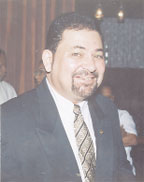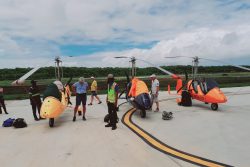The high cost of bandwidth continues to be a deterrent to overseas investors and may have cost the country between 2,000 to 3,000 jobs, Head of Guyana Office for Investment (Go-Invest) Geoffrey Da Silva said recently.
Responding to a question posed noted at an Investment Seminar on Friday by one of the overseas participants regarding the availability of Information and Communi-cation Technologies (ICTs) locally, Da Silva said that the high cost for bandwidth was a major concern. While emphasizing that the Guyana Telephone and Telegraph Company (GT&T) had been very supportive to the initiatives of Go-Invest, he admitted that this was a sore point between Go-Invest and the telephone company.

According to Da Silva, some firms involved in the call centre business had informed him that they were being charged US$8,000 for bandwidth services. He said that this rate was extremely expensive when compared with other territories in the region.
Da Silva said he has had meetings with some of the large international call centre companies, and they pointed out that what is preventing them from investing in Guyana is the high cost of bandwidth. He said that this was costing young people jobs. “We have young people who are very skilled,” Da Silva stated, “among the best in the region.” However, he said, some did not get the jobs they wanted.
Da Silva told this newspaper that the assessment of the skills of Guyanese youth was also made by Accenture, an international consulting company, which had conducted a survey in Guyana last year.
Nevertheless, Da Silva is optimistic that when the GT&T-funded new multi-million dollar fibre optic cable becomes operational next year, the cost customers pay for bandwidth will come down. He admitted that competition may be necessary to get competitive rates and stated that there had been negotiations with French investors for them to run another fibre optic cable to the country. However, he was unable to say how these negotiations were going. Other options were being pursued as well, Da Silva told this newspaper.
Meanwhile, another issue raised at the forum was whether foreigners, who are coming to invest in Guyana, would have access to land in the same manner locals do, especially in the context of the Caribbean Single Market and Economy (CSME). This was raised by a St Lucian national.
In response, Da Silva said that for over 30 years, overseas investors were allowed access to land in Guyana. He pointed out that in the past groups of nationals from other Caribbean territories had occupied land without any problems and that this would continue.
Da Silva also noted that the time it took for entrepreneurs to receive fiscal concessions had been significantly shortened. He said that this process could now be completed within a month, when compared to the six months it took ten years ago.









